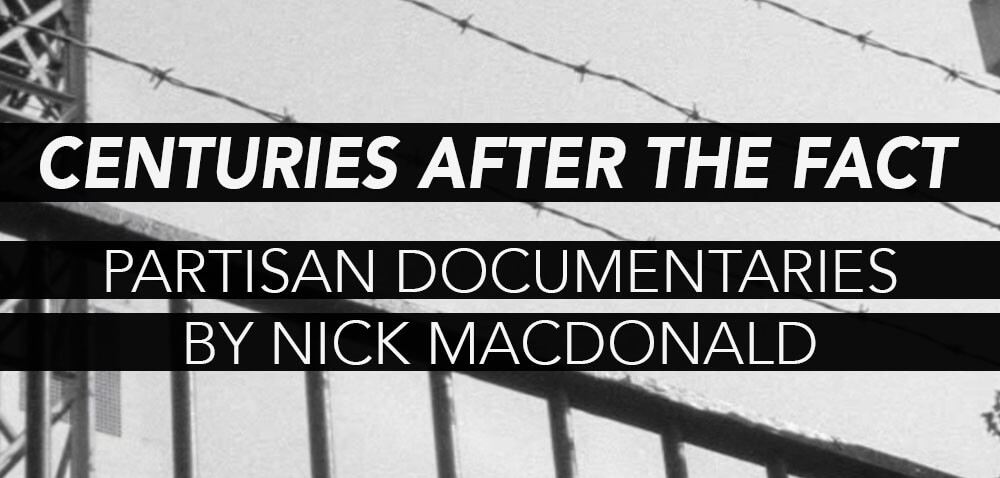
THURSDAY, NOVEMBER 2ND
ONE NIGHT ONLY – 7:30PM & 10PM
PRESENTED ON 16MM WITH FILMMAKER IN ATTENDANCE
“Of course, there’s no objective truth, no real-life documentaries, no accurate histories; only one person’s distortion, one person’s view. This is my own view, the way I see it.”
Perspective is a recurring theme in Macdonald’s idiosyncratic essay films, which remain deeply personal even when dealing with expansive issues like colonialism, imperialism, and prison abolition. Shot largely in his home, Macdonald deploys paper collage and letterboard text to create films that convey a palpable sense of their own handcrafting. He is never the voice of authority, but rather just one voice with a singular point of view. Disarmingly humorous at times, Macdonald’s films are empathetic and non-dogmatic. But make no mistake, Macdonald’s position is both clear and radical.
For one night only, Spectacle will present a three-film program dealing with the “documentary” form. These films address concepts of truth and authority and contribute to alternative histories of Palestine, the Vietnam War, and the Attica Prison Revolt. As Nick told us himself, some of these prints haven’t been screened in New York since the 1970s, and it’s our sincere pleasure to present this vital work for a new audience.
Special thanks to Nick Macdonald.
Program:
STILL ATTICA REMAINS
dir. Nick Macdonald, 1976
USA, 15 min.
English
Shot on September 13th, 1975 in New York City, STILL ATTICA REMAINS revisits the Attica Prison Uprising exactly four years after its violent end at the hands of state actors. Handheld footage of the city acts as a backdrop as Macdonald recounts the events of the rebellion, focusing in particular on then-governor Nelson Rockefeller’s refusal to negotiate and his role in escalating the conflict that resulted in 43 deaths.
Both a screed against political power and a memorial to those who have lost their lives because of their exclusion from our society, STILL ATTICA REMAINS is a heartfelt contribution to the prison abolition movement; as powerful today as it was in 1975.
THE LIBERAL WAR
dir. Nick Macdonald, 1972
United Communities of Anarchism, 33 min.
English
“Demonstrations are ok as long as you don’t take them too seriously…”
This quote gives a good idea of the motivations for Macdonald’s THE LIBERAL WAR, which plucks big problems out of the hegemonic ether and puts them to work in front of his camera. They take the form of newspaper cutouts, paint and paper, children’s blocks, and plastic toy soldiers. THE LIBERAL WAR re-tells the Vietnam War from a living room table covered in domestic tools, and an analysis born of careful observation. The story moves through screen in stop-motion words and objects; the approach feels free of the weight of authority.
This film avoids the self-righteous and ultra-serious tones that come out when the subject matter is war, injustice, and destruction. Perhaps because the narrator is speaking from a future society operating by anarchist principles. It is also achieved in the simple but meticulous feel of this film. The old figures of corrupt and war-driven society feel flatter and dumber, coming into the storyline through manipulated newspaper clippings and re-appropriated slogans. In this film, we are in another place, removed from the chaos and destruction distributed through mass media and audio fragments.
PALESTINE
dir. Nick Macdonald, 1971
USA. 38 min.
English
The earliest film of this series, PALESTINE presents a short history of Israel’s colonial relationship to Palestine. Developing some of the formal devices that return in THE LIBERAL WAR and STILL ATTICA REMAINS, Macdonald intercuts staged footage shot in his home, handmade collages, and intertitles to relay under-remembered historical events.
Throughout the film, he juxtaposes sound and image to create associations. When he recounts a 1967 general strike in East Jerusalem, he presents imagery of the Newark Riots that occurred the same year, creating a visual solidarity between the struggles of Palestinians and the struggles of Black Americans. Textual wordplay, and even the occasional visual gag (a literal “sweeping under the rug,” for instance) add a sense of levity without distracting from the injustices suffered by the Palestinian people.
Macdonald asserts that Israel’s moral superiority is predicated on an ahistorical viewpoint, and so he believes that the first step in taking action is to educate oneself. As he narrates in the film, “it’s up to you to assimilate these facts.”
